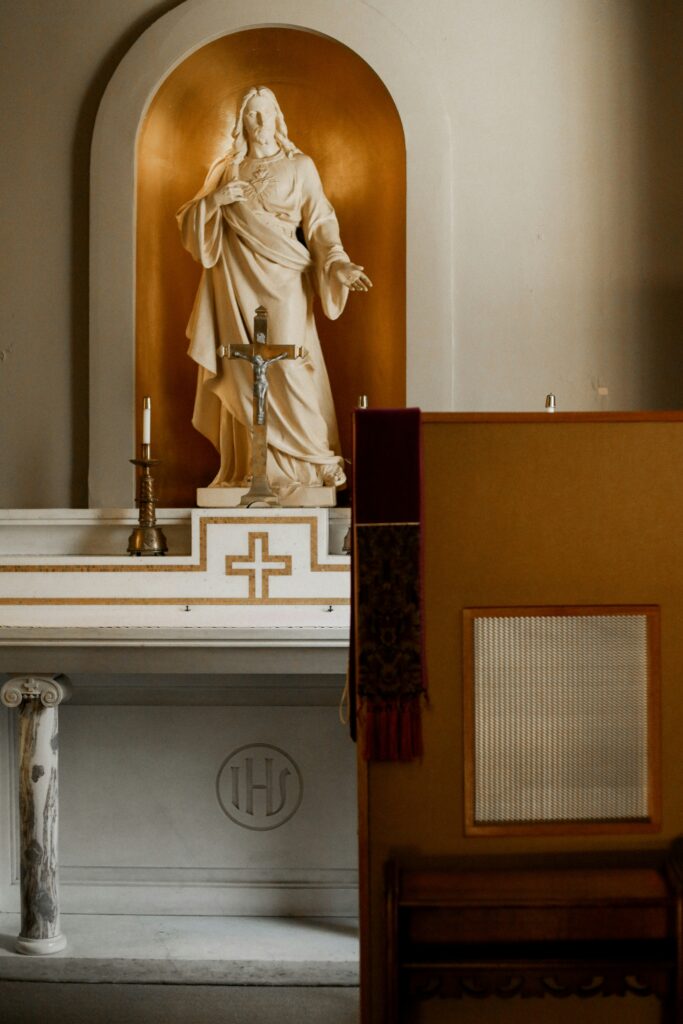What is the Sacrament?
 The Sacrament of Reconciliation, also known as Confession or Penance, is the sacrament of God’s mercy and forgiveness. Through it, the faithful who have sinned after Baptism are reconciled with God and with the Church. The priest, acting in the name of Christ, pronounces absolution, and the person is restored to grace and friendship with God.
The Sacrament of Reconciliation, also known as Confession or Penance, is the sacrament of God’s mercy and forgiveness. Through it, the faithful who have sinned after Baptism are reconciled with God and with the Church. The priest, acting in the name of Christ, pronounces absolution, and the person is restored to grace and friendship with God.
The Catechism of the Catholic Church describes it as the sacrament “through which the sinner is reconciled with God and the Church, and receives the gift of God’s mercy” (CCC 1422–1498). The Risen Christ gave this power to his apostles when he said:
“Receive the Holy Spirit. If you forgive the sins of any, they are forgiven.” (John 20:22–23)
Confession is not simply the act of naming faults. It is an encounter with Christ himself, who heals, restores, and renews the human heart. It is a sacrament of conversion, inviting us to turn again towards God’s love.
What does it mean for us today?
To confess one’s sins is an act of honesty and faith. It acknowledges that we fall short and that we need God’s mercy. In a world that often prizes self-sufficiency, Reconciliation teaches humility and truthfulness. It opens us to grace, allowing us to begin again.
The sacrament reminds us that forgiveness is never earned but freely given. It restores peace to the soul and strengthens the will to live as a disciple. Frequent confession helps a person grow in virtue and self-knowledge. It allows us to see life more clearly in the light of the Gospel.
The Catechism calls this sacrament “a continual conversion of the heart” (CCC 1435). It is not only about guilt but about renewal — about being set free to love again. The Church encourages all the faithful to celebrate the sacrament regularly, and especially during Lent and Advent, the traditional penitential seasons.
Preparing for the Sacrament
Preparation for confession involves an honest examination of conscience -a prayerful review of one’s words, actions, and omissions in the light of God’s commandments and the teaching of Christ. This can be guided by the Ten Commandments, the Beatitudes, or the summary of the law of love: to love God and neighbour.
Before entering the confessional or reconciliation room, it is good to pray for humility and the grace to make a sincere confession. The priest may help guide the penitent if they are unsure what to say or how to begin.
Children preparing for First Penance usually do so in the months before their First Holy Communion. This is often done in cooperation between parish, home, and school. It is an opportunity for parents to speak with their children about forgiveness and mercy, helping them understand that God’s love is greater than any mistake.
Adults returning to the sacrament after some time are encouraged to approach it calmly and without fear. The priest is there not to judge but to represent Christ, who listens, heals, and forgives.
The Celebration of the Sacrament
The celebration of the Sacrament of Reconciliation may take place in two forms: individual confession and absolution, or a communal service with individual confession. Both forms begin with prayer and reflection on God’s word.
When confessing individually, the penitent greets the priest, makes the sign of the cross, and begins by saying how long it has been since their last confession. They then speak honestly about the sins they wish to confess. The priest may offer words of counsel or encouragement and will then propose an act of penance – a prayer, a reflection, or a simple act of charity – to help repair what has been damaged and to support conversion of heart.
The penitent then prays an act of contrition, expressing sorrow for sin and trust in God’s mercy. The priest extends his hand and gives absolution:
“God, the Father of mercies, through the death and resurrection of his Son, has reconciled the world to himself and sent the Holy Spirit among us for the forgiveness of sins; through the ministry of the Church may God give you pardon and peace, and I absolve you from your sins in the name of the Father, and of the Son, and of the Holy Spirit.”
After receiving absolution, the penitent leaves in peace, renewed by grace and restored to communion with God and the Church.
In many parishes, the sacrament is available each week, often before or after Mass, or by appointment. The faithful are encouraged to take part regularly as part of their spiritual life.
Living the Sacrament
 The grace received in Reconciliation is meant to shape the daily life of every Christian. Forgiven and restored, we are called to forgive others, to act with mercy, and to seek peace. The sacrament strengthens us against temptation and renews our desire to live by the Gospel.
The grace received in Reconciliation is meant to shape the daily life of every Christian. Forgiven and restored, we are called to forgive others, to act with mercy, and to seek peace. The sacrament strengthens us against temptation and renews our desire to live by the Gospel.
Pope Francis has said:
“The Lord never tires of forgiving us. It is we who tire of asking for forgiveness.”
Regular confession keeps the heart free from resentment and pride. It teaches compassion, patience, and hope. In a deeper sense, it forms us into a more truthful people – aware of our weakness yet confident in God’s mercy.
To live the Sacrament of Reconciliation is to live each day in the knowledge that we are loved beyond measure, called to conversion, and entrusted with the work of mercy in a wounded world.